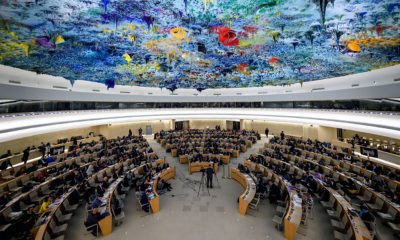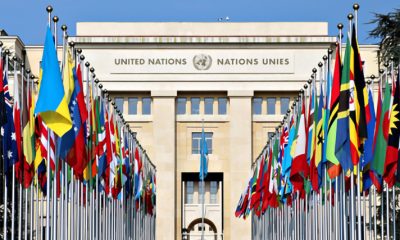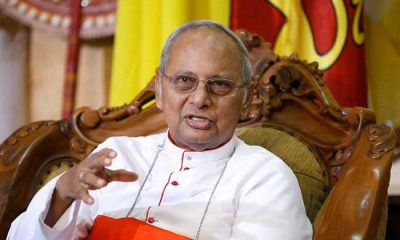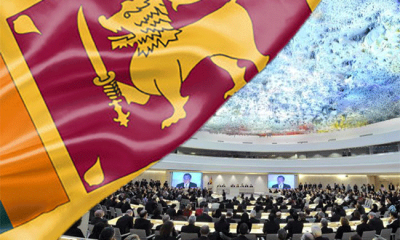News
Lanka’s friendly nations abstained UNHRC voting – foreign minister
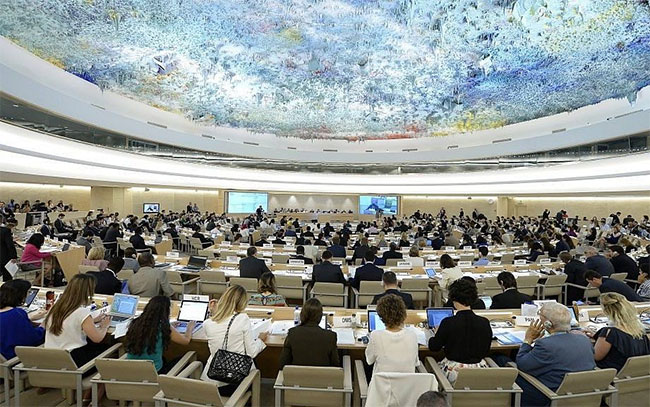
By SHIHAR ANEEZ
ECONOMYNEXT –The latest resolution that promotes reconciliation in Sri Lanka was passed by 20 votes against 7 at the United Nations Human Rights Council (UNHRC) on Thursday with many countries which have been close to the island nation’s ruling elite voted against the island nation’s wish.The new resolution also has focused on how human rights impact of the economic crisis.
Twenty countries including India, Japan, Indonesia, Qatar Malaysia, and the United Arab Emirates abstained from the voting for the resolution that also demands the island nation to address past human rights abuses.
“This is nothing unexpected. There was so much pressure on some countries to vote in favour of the resolution. So we knew this,” Foreign Minister Ali Sabry told EconomyNext via phone from Geneva soon after the voting ended.
“The composition has changed and some of our friendly nations are not there and some abstained,” Minister Sabry said.
“This has been in the agenda from 2009. Locally we we have to come with a strong truth seeking mechanism which we should have done from 2009 to a level where no other country meddles with our internal matter.”
The new resolution, the toughest Sri Lanka has faced so far, is likely to tighten Sri Lanka’s space to deal with international trade further as several key conventions in trade concessions like Europe’s GSP Plus are tied directly to human rights.Already the European Union has threatened to withdraw its trade concession as the country has failed to fulfill its commitments on implementing some key international conventions.
The draft resolution, titled “Promoting reconciliation, accountability and human rights in Sri Lanka” and sponsored by the United Kingdom, the United States, Germany, Canada, Malawi, Montenegro and North Macedonia.It is the 7th UNHRC resolution against Sri Lanka’s human rights record since a 26-year war ended in 2009. Sri Lanka won against the resolution only in 2009 and there was no voting in 2015 as Sri Lanka opted to cooperate with the UNHRC resolution.
The latest resolution comes as Sri Lanka is seeking support of all foreign nations to find its way out from an unprecedented economic crisis that led to a political crisis and ousted former prime minister and president after their economic mismanagement.The draft also underscores the importance of addressing underlying governance factors and root causes that have contributed to Sri Lanka’s unprecedented economic crisis. It also recognizes that the promotion and protection of human rights and the prevention of and fight against corruption are mutually reinforcing.
The UN Human Rights High Commissioner in a report recommended to reduce military spending considerably, tackle corruption decisively, increase investments in health, social security and education through international cooperation and assess any potential human rights impact of international financial assistance programmes and take preventive measures to reduce it to the bare minimum.
Simon Manley, the Ambassador and Permanent Representative for the United Kingdom Mission to the WTO, UN and Other International Organisations (Geneva) said the resolution text is largely based on last year’s resolution but has been updated to reflect some of the key developments over the last 18 months including an economic crisis, mass protests, and a change in government, all of which have had a significant bearing on the human rights situation in the country.
“It reflects some of the more recent concerns outlined in the High Commissioner’s report, especially the human rights impact of the economic crisis,” he said.
The main requests in the resolution seek to continue the work initiated in last year’s resolution which created capacity within the Office of the High Commissioner to collect, consolidate, analyse and preserve information to support judicial and other proceedings.
“This capacity was set up in response to the lack of progress made by Sri Lanka’s domestic legal mechanisms towards accountability for past alleged gross violations of human rights.”
The new draft requests further reporting by office of UN High Commissioner for Human Rights (OHCHR) and proposes to move from an 18-month time frame to 2 years with an aim to give sufficient time amid economic crisis.
“The adoption of the UN Human Rights Council’s resolution reflects the need for continuing international scrutiny on Sri Lanka,” Dinushika Dissanayake, Amnesty International’s Deputy Regional Director for South Asia, said in a statement.
“The Government of Sri Lanka should abide by the commitments it has made to the international community and ensure the effective operation of redressal bodies for human rights violations, such as the Human Rights Commission of Sri Lanka, the Office on Missing Persons, the Office on Reparations, and the National Authority for the protection of Victims of a Crime and Witnesses, among others.”
Meenakshi Ganguly, South Asia director for Human Rights Watch said Sri Lankan government should now act to uphold economic, social and political rights demanded by thousands through peaceful protests, end repression against protesters, and ensure accountability for abuses including war crimes.
Sri Lankan government has taken some baby steps to address to protect human rights and the past violations. That drew severe criticism from the West and rights groups as successive Sri Lankan government failed to hold anybody accountable for the past violations.
Sri Lanka’s Foreign Minister Ali Sabry has said the country will not support any external evidence gathering mechanism as it was against the island nation’s constitution. He has also criticised the inclusion of economic crisis in the latest draft citing that the UNHRC has no mandate to probe economic crimes.Sri Lanka is in the process of obtaining a $2.9 billion IMF loans and some government officials have raised concerns over the latest resolution which has included economic crimes and corruption.
“We have not been informed anything by the IMF if there could be an impact on the loan due to the UNHRC resolution,” Central Bank governor Nandalal Weerasinghe told reporters in Colombo at the monetary policy rates briefing on Thursday.
News
US sports envoys to Lanka to champion youth development

The U.S. Embassy in Colombo welcomed the U.S. Sports Envoys to Sri Lanka, former National Basketball Association (NBA) and Women’s National Basketball Association (WNBA) players Stephen Howard and Astou Ndiaye, from June 8 through 14.
The Public Diplomacy section of the U.S. Embassy said that it would launch a weeklong basketball program intended to harness the unifying power of sports, made possible through collaboration with Foundation of Goodness and IImpact Hoop Lab.
While in Sri Lanka, Howard and Ndiaye, both retired professional basketball players, will conduct a weeklong program, Hoops for Hope: Bridging Borders through Basketball. The Sports Envoys will lead basketball clinics and exhibition matches and engage in leadership sessions in Colombo and Southern Province for youth aged 14-18 from Northern, Uva, Eastern and Western Provinces, offering skills and leadership training both on and off the court. The U.S. Envoys will also share their expertise with the Sri Lanka Basketball Federation, national coaches, and players, furthering the development of basketball in the country. Beyond the clinics, they will collaborate with Sri Lankan schoolchildren to take part in a community service project in the Colombo area.
“We are so proud to welcome Stephen and Astou as our Sports Envoys to Sri Lanka, to build on the strong people-to-people connections between the United States and Sri Lanka,” said U.S. Ambassador Julie Chung. “The lessons that will be shared by our Sports Envoys – communication, teamwork, resilience, inclusion, and conflict resolution – are essential for leadership development, community building, equality, and peace. The U.S. Sports Envoy program is a testament to our belief that sports can be a powerful tool in promoting peace and unity.”
News
Rahuman questions sudden cancellation of leave of CEB employees

SJB Colombo District MP Mujibur Rahuman in parliament demanded to know from the government the reasons for CEB suspending the leave of all its employees until further notice from Thursday.
MP Rahuman said that the CEB has got an acting General Manager anew and the latter yesterday morning issued a circular suspending leave of all CEB employees with immediate effect until further notice.
“We demand that Minister Kanchana Wijesekera should explain this to the House. This circular was issued while this debate on the new Electricity Amendment Bill was pending. There are many who oppose this Bill. The Minister must tell parliament the reason for the urge to cancel the leave of CEB employees,” the MP said.However, Speaker Mahinda Yapa Abeywardena prevented Minister Wijesekera responding to the query and said that the matter raised by MP Rahuman was not relevant.
News
CIPM successfully concludes 8th Annual Symposium

The Chartered Institute of Personnel Management (CIPM) successfully concluded the 8th Annual CIPM Symposium, which took place on 31st May 2024. Themed “Nurturing the Human Element—Redefining HRM in a Rapidly Changing World,” the symposium underscored the pivotal role of human resource management (HRM) in today’s dynamic global landscape. Since its inception in 1959, CIPM has been dedicated to advancing the HR profession through education, professional development, and advocacy, solidifying its position as Sri Lanka’s leading professional body for HRM.
Ken Vijayakumar, the President of the CIPM, graced the occasion as the chief guest. The symposium commenced with the welcome address by the Chairperson, Prof. Arosha Adikaram, followed by the Web Launch of the Symposium Proceedings and Abstract Book by the CIPM President. The event featured distinguished addresses, including a speech by Chief Guest Ken Vijayakumar, President of CIPM, and an address by Guest of Honor Shakthi Ranatunga, Chief Operating Officer of MAS Holdings Pvt. Ltd., Sri Lanka.
The symposium also featured an inspiring keynote address by Prof. Mario Fernando, Professor of Management and Director of the Centre for Cross Cultural Management (CCCM) at the University of Wollongong, Australia.
Vote of Thanks of the inauguration session was delivered by Dr. Dillanjani Weeratunga, Symposium Co-chair.
The symposium served as a comprehensive platform for researchers to present their findings across a wide range of critical topics in HRM. These included Cultural Diversity and Inclusion, Talent Development and Retention, Ethical Leadership and Corporate Social Responsibility, Adapting to Technological Advancements, Mental Health and Well-being at Work, Global Workforce Challenges, Employee Empowerment, and Reskilling and Upskilling.
The plenary session was led by Prof. Wasantha Rajapakse. Certificates were awarded to the best paper presenters during the valedictory session, followed by a vote of thanks delivered by Kamani Perera, Manager of Research and Development.
The annual symposium of CIPM was a truly inclusive event, attracting a diverse audience that spanned undergraduates, graduates, working professionals, research scholars and lecturers. This widespread interest highlights the symposium’s significance in the field of HRM, offering a unique opportunity for everyone to network and learn from scholarly brains.The CIPM International Research Symposium was sponsored by Hambantota International Port, Sri Lanka Institute of Information Technology (SLIIT), E B Creasy & Co. PLC, and Print Xcel Company.


